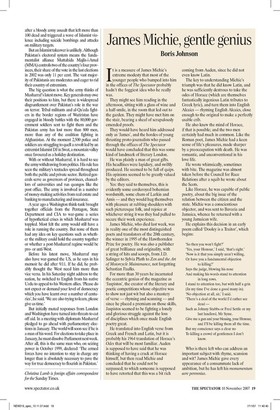James Michie, gentle genius
Boris Johnson /t is a measure of James Michie's extreme modesty that most of the younger people who bumped into him in the offices of The Spectator probably hadn't the foggiest idea who he really was.
They might see him reading in the afternoon, sitting with a glass of wine and a half-smile, in the room that led out to the garden. They might have met him on the stair, bearing a sheaf of scrupulously emended proofs.
They would have heard him addressed only as 'James', and the hordes of young thrusting proto-journalists who passed through the offices of The Spectator would have concluded that this was some kind of landmark of literary London.
He was plainly a man of great gifts. His headlines were lapidary, and swiftly produced. He seemed to be full of quips. His opinions seemed to be greatly valued by the editors.
Yes: they said to themselves, this is evidently some corduroyed bohemian wordsmith, some chum of Larkin and Amis — and they would hug themselves with pleasure at rubbing shoulders with such picturesque folk, and rejoice at whichever string it was they had pulled to secure their work experience.
James Michie, who died last week, was in reality one of the most distinguished poets and translators of the 20th century, the winner in 1995 of the Hawthornden Prize for poetry. He was also a publisher of great brilliance and originality, with a string of hits and scoops, from J.D. Salinger to Sylvia Plath to Zen and the Art of Motorcycle Maintenance, not forgetting Sebastian Faulks.
For more than 30 years he incarnated the eccentric genius of the magazine as Jaspistos', the creator of the literary and poetic competitions whose objective was to show not just wit but also a mastery of verse — rhyming and scanning — and since he placed a premium on those skills, Jaspistos seemed to be fighting a lonely and glorious struggle against the loss of disciplines which once made English poetry great.
He translated into English verse from Greek and French and Latin, but it is probably his 1964 translation of Horace's Odes that will be most familiar. Auden is supposed to have said that he was thinking of having a crack at Horace himself, but then read Michie and concluded that he could not be surpassed; to which someone is supposed to have retorted that this was a bit rich coming from Auden, since he did not even know Latin.
The key to understanding Michie's triumph was that he did know Latin, and he was sufficiently dextrous to take the odes of Horace (which are themselves fantastically ingenious Latin tributes to Greek lyric), and turn them into English Alcaics — rhyming English Alcaics, close enough to the original to make a perfectly usable crib.
He also knew the mind of Horace, if that is possible; and the two men certainly had much in common. Like the Roman poet, James Michie had a keen sense of life's pleasures, made sharper by a preoccupation with death. He was romantic, and unconventional in his love life.
He wrote whimsically, sometimes with bite. The magazine was almost taken before the Council for Race Relations after a squib he wrote about the Scots.
Like Horace, he was capable of public poetry, about the big issue of the relation between the citizen and the state. Michie was a conscientious objector, and was sent to Bavaria and Jamaica, whence he returned with a young Jamaican wife.
He explains this decision in an early poem called 'Dooley is a Traitor', which begins: 'So then you won't fight?'
'Yes, your Honour,' I said, 'that's right.'
'Now is it that you simply aren't willing, Or have you a fundamental objection to killing?'
Says the judge, blowing his nose And making his words stand to attention in long rows.
I stand to attention too, but with half a grin (In my time I've done a good many in).
'No objection at all, sir,' I said.
'There's a deal of the world I'd rather see dead— Such as Johnny Stubbs or Fred Settle or my last landlord, Mr Syme.
Give me a gun and your blessing, your Honour, and I'll be killing them all the time.
But my conscience says a clear no To killing a crowd of gentlemen I don't know.
Who is there left who can address an important subject with rhyme, scansion and wit? James Michie gave every appearance of a consummate lack of ambition, but he has left his monumentum acre perennius.





































































 Previous page
Previous page